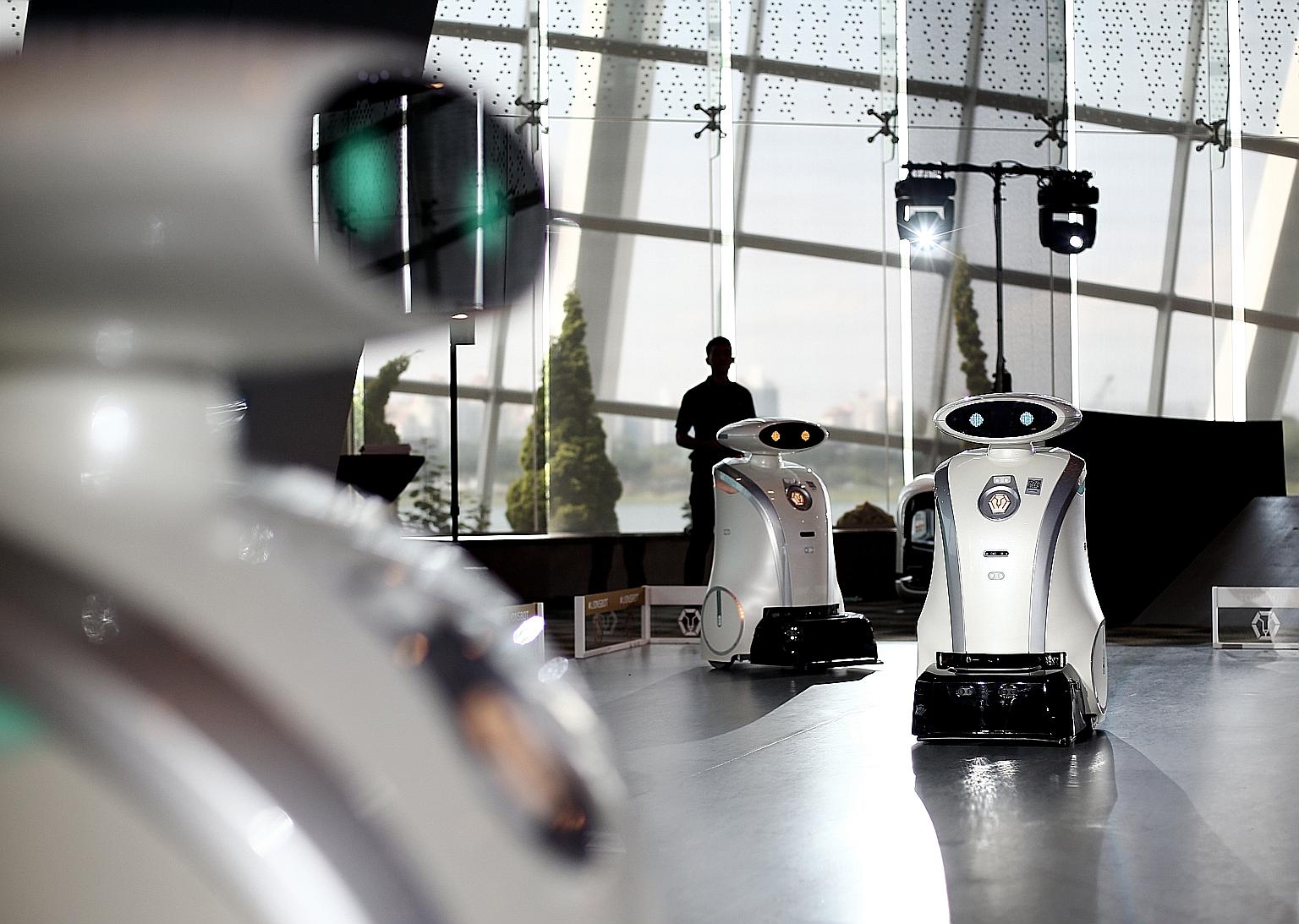Pandemic spurs transformation in Singapore's cleaning industry
Enhanced grant from NEA defrays costs as firms adopt more tech solutions, upskill workforce
Sign up now: Get ST's newsletters delivered to your inbox

A variety of floor-cleaning robots that scrub, mop and vacuum, manufactured by Singapore company LionsBot International.
LIANHE ZAOBAO FILE PHOTO
The Covid-19 pandemic has triggered rapid changes in the cleaning industry, as the overwhelming demand for more cleaners and better cleaning services is likely to extend far beyond the outbreak.
One indication of these changes as the industry tries to meet increased demand for its services is the big uptick in applications for the National Environment Agency's (NEA) enhanced Environmental Services Productivity Solutions Grant (ES PSG).
The grant, which was launched in September 2018 to raise the operational efficiency and productivity of the environmental service industry, will now defray up to 80 per cent of the cost of the cleaning solutions that commercial businesses choose to adopt as part of their cleaning systems.
As at last Wednesday, NEA had approved more than 770 applications from companies for the grant, with a total commitment of about $15 million.
This amount will be capped at $350,000 a company, and is an increase from the funding support of up to 50 per cent and grant cap of $250,000 a company that was previously available.
An NEA spokesman said: "The environmental services (ES) industry is facing manpower shortage and operational challenges due to Covid-19. Generally, ES firms are facing manpower shortage for core occupations, such as general cleaners, waste collection attendants and pest control workers.
"However, the Covid-19 situation also provided the ES industry with unique opportunities to transform and emerge stronger." The spokesman added that the agency expects the demand for cleaning and disinfection services to continue post-Covid-19.
The widespread adoption of more cleaning technology, such as robotic floor sweepers, workforce management and other digital solutions could give ES companies the chance to upskill their workforce and improve the technological know-how of the cleaning industry as a whole.
The ES PSG is also set to reduce the sector's reliance on manual labour and create better jobs for the sector, going forward.
In the meantime, to meet the increased demand for cleaners providing disinfection services for commercial and residential needs, Workforce Singapore and NEA have also partnered the Environmental Management Association of Singapore to launch a "Place-and-Train" programme for cleaning specialists in disinfection services this month.
Companies at the forefront of technological and digital cleaning solutions are also doubling down to put more cleaning systems out in the market.
$15m Total commitment approved under the National Environment Agency's enhanced Environmental Services Productivity Solutions Grant scheme as at last Wednesday.
80% Increase in inquiries about LionsBot International's cleaning and disinfection robots during the pandemic.
For instance, Singapore company LionsBot International has seen an increase in demand for cleaning and disinfection robots since March, and has received 80 per cent more inquiries about its services since the pandemic began.
Mr John Chan, vice-president of business development at LionsBot, said: "We manufacture a variety of floor-cleaning robots that scrub, mop and vacuum. These robots are in such high demand because they are able to support cleaners (by doing) time-consuming cleaning tasks, so the cleaners can focus on things like wiping down high-touch-point areas, toilets and hidden corners where germs might lurk."
For example, its autonomous UV-light disinfection robot helps cleaners disinfect large surface areas without exposing them to viruses - particularly at high-risk premises with heavy footfall, such as transport terminals, hospitals and shopping centres.
Such cleaning robots have helped the cleaning industry cope with labour shortages. It faces challenges that include the need for more frequent cleaning and rigorous cleaning standards, coupled with the lack of manpower to support this demand, said Mr Chan.
LionsBot is looking towards growing its business, as the demand for cleaning robots has increased both locally and globally.
"We are expanding our business to innovate and design more types of cleaning robots, and to increase LionsBot's production output. At the moment, we are also hiring and training staff to support this business expansion," said Mr Chan.


